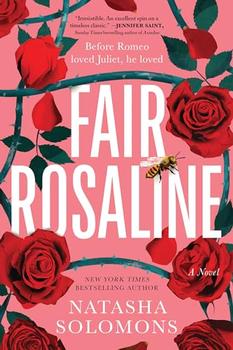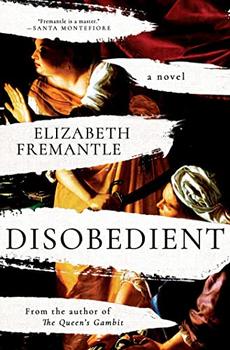Summary | Excerpt | Reading Guide | Discuss | Reviews | Beyond the book | Read-Alikes | Genres & Themes | Author Bio

A Novel
by Natasha SolomonsRomeo and Juliet is arguably Shakespeare's best known and most performed work, yet Rosaline, a character who plays a pivotal role in its opening acts, is seldom recalled; although she's Romeo's obsession before he meets Juliet, the Bard gives her no voice. In Fair Rosaline, Natasha Solomons corrects this oversight, rewriting the tale from this forgotten woman's point of view and casting the star-crossed lovers in a completely new light.
As Solomons begins her tale, 15-year-old Rosaline Capulet has just lost her mother to the plague and her father is sending her off to a convent, where she'll remain cloistered for the rest of her life. She bargains for a 12-day reprieve, and vows to spend the time enjoying life as much as she can. She sneaks into a party given by her family's enemies, the Montagues, where she and Romeo meet and enjoy a romance that lasts until Romeo encounters Rosaline's cousin, 13-year-old Juliet. The story largely follows Shakespeare's Romeo and Juliet from that point, although as observed by Rosaline.
What turns this familiar tale on its head is the author's depiction of Romeo. In her imagination, he's not a teenager in love but an older predator – Solomons envisions him to be about 30 – who's constantly on the prowl for extremely young women he can use and then callously discard. It's an incredibly creative take on the story, turning it from a romantic tragedy into a much darker narrative about powerful, manipulative men and their victims.
In addition to simply being an interesting spin on an old story, Fair Rosaline is top-notch historical fiction. Solomons frequently inserts period details that lend her account credibility. She writes, for example, that people sniffed "posies and oranges studded with cloves to ward off the plague" and that "harmony in church was banned by Rome for inspiring profane and lustful thoughts" – information that helps her readers become fully immersed in the world she creates. Her dialog, too, mimics what one thinks of as period speech without it becoming so realistic as to be unintelligible (e.g., "I should like to know you better, daughter"). It comes across a little stilted at first, but once one's "reading ear" gets used to it, it's effective, preventing the dialog from seeming too modern. I was also impressed by the author's beautifully descriptive writing:
At dawn the sun rose again and Rosaline with it. The dew was fresh upon the grass, laundering it clean and bright and luridly indifferent to her misfortune. Bees diligently pursued dangling lobes of jasmine for pollen, and a woodpecker rapped for breakfast.
The author takes a risk rewriting such a well-known and beloved tale, and some may have a difficult time enjoying such a radical reinterpretation. I for one found it challenging to reconcile Shakespeare's Romeo with Solomons', and I remain unconvinced by her rationale for this interpretation of the play, which she bases on Shakespeare's unusual emphasis on Juliet's age. And although Solomons' attention to historical minutia is admirable, at times her characters' actions and attitudes seem anachronistic, especially regarding Rosaline's interactions with Romeo and Tybalt.
Despite the issues mentioned above, I found Fair Rosaline interesting and entertaining, and a worthwhile read. I recommend it to readers who've enjoyed books like Circe and Ariadne – novels that give voice to women who, until now, have been silenced. Its beautiful prose and outstanding historical detail should make it popular with those who appreciate well-written historical fiction, and its feminist themes make it a good choice for book discussions.
![]() This review was originally published in The BookBrowse Review in October 2023, and has been updated for the
June 2024 edition.
Click here to go to this issue.
This review was originally published in The BookBrowse Review in October 2023, and has been updated for the
June 2024 edition.
Click here to go to this issue.

If you liked Fair Rosaline, try these:

by Sandra Newman
Published 2024
An imaginative, feminist, and brilliantly relevant-to-today retelling of Orwell's 1984, from the point of view of Winston Smith's lover, Julia, by critically acclaimed novelist Sandra Newman.

by Elizabeth Fremantle
Published 2023
A riveting novel based on the life of Artemisia Gentileschi—the greatest female painter of the Renaissance—as she forges her own destiny in a world dominated by the will of men.
If there is anything more dangerous to the life of the mind than having no independent commitment to ideas...
Click Here to find out who said this, as well as discovering other famous literary quotes!
Your guide toexceptional books
BookBrowse seeks out and recommends the best in contemporary fiction and nonfiction—books that not only engage and entertain but also deepen our understanding of ourselves and the world around us.